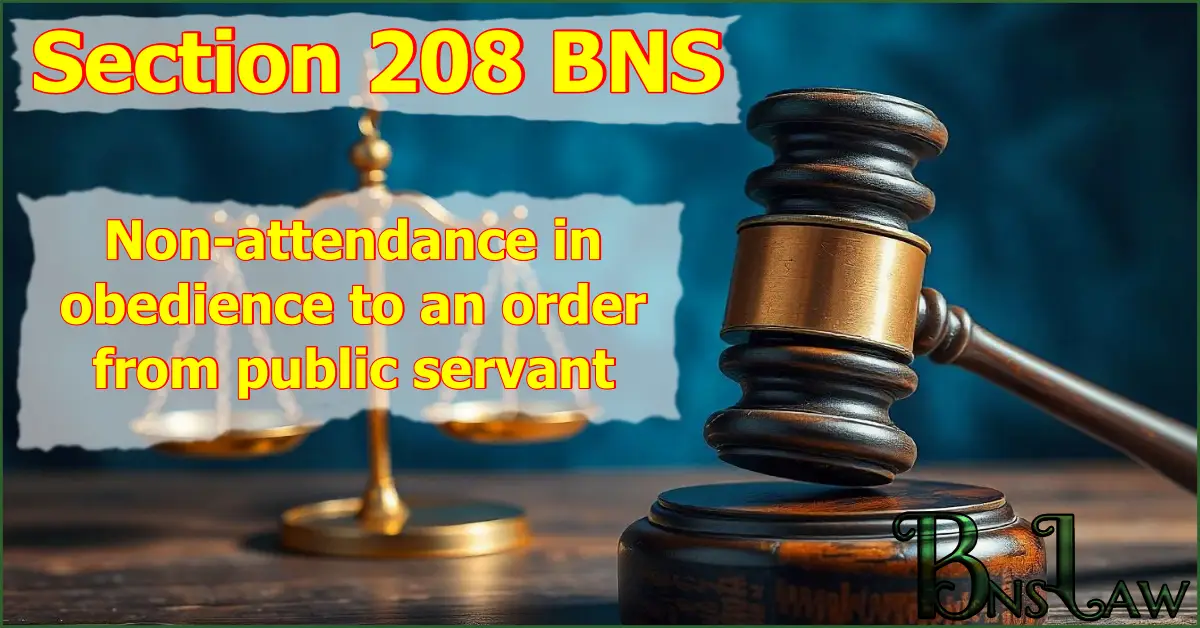Section 208 BNS | BNS 208 | BNS Section 208
Whoever, being legally bound to attend in person or by an agent at a certain place and time in obedience to a summons, notice, order, or proclamation proceeding from any public servant legally competent, as such public servant, to issue the same, intentionally omits to attend at that place or time or departs from the place where he is bound to attend before the time at which it is lawful for him to depart,
208(a) BNS
shall be punished with simple imprisonment for a term which may extend to one month, or with fine which may extend to five thousand rupees, or with both;
208(b) BNS
where the summons, notice, order or proclamation is to attend in person or by agent in a Court with simple imprisonment for a term which may extend to six months, or with fine which may extend to ten thousand rupees, or with both.
Illustrations
(a) A, being legally bound to appear before a High Court, in obedience to a subpoena issuing from that Court, intentionally omits to appear. A has committed the offence defined in this section.
(b) A, being legally bound to appear before a District Judge, as a witness, in obedience to a summons issued by that District Judge intentionally omits to appear. A has committed the offence defined in this section.
READ OTHER SECTIONS OF CHAPTER XIII — OF CONTEMPTS OF THE LAWFUL AUTHORITY OF PUBLIC SERVANTS
FAQs of BNS Section 208
-
208 BNS punishment and fine
Punishment and fine under Section 208 of the BNS—
208(a): Simple imprisonment for 1 month, or fine of 5,000 rupees, or both.
208(b): Simple imprisonment for 6 months, or fine of 10,000 rupees, or both. -
208 BNS cognizable or not
The offence under Section 208(a) and 208(b) of the BNS is non-cognizable.
-
208 BNS bailable or not
The offence under Section 208(a) and 208(b) of the BNS is bailable.
-
208 BNS trial court
Offence specified in Section 208(a) and 208(b) of the BNS is triable by any Magistrate.
Important Points
- Cognizable Offences: These are offences where a police officer can arrest a person without a warrant.
- Non-Cognizable Offences: These are offences where a police officer cannot arrest a person without a warrant.
- Bailable Offences: These are offences where the accused can get bail from the police station itself. All bailable offences are listed in the First Schedule of the Bharatiya Nagarik Suraksha Sanhita (BNSS).
- Non-Bailable Offences: Offences in which bail is not granted directly from the police station but after hearing the case in the court, the judge decides when bail will be granted. All non-bailable offences are listed in the first schedule of the Bharatiya Nagarik Suraksha Sanhita (BNSS).
- In the above FAQ, “trial court” means the court that has jurisdiction to try the offence.
- In the above FAQ, the expression “Magistrate of the first class” and “Any Magistrate” does not include Executive Magistrates.
Read other Sections of the BNS
Reference Link: New Criminal Laws (BNS), Ministry of Home Affairs







